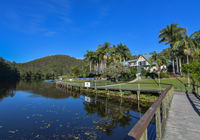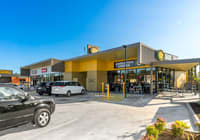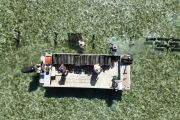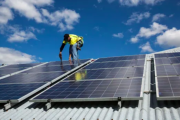
Future Fund-backed OneFortyOne in mega forestry deal
OneFortyOne, a major forestry and sawmill business majority owned by the Future Fund and other big super funds, has taken over a near 15,000-hectare timber estate in southern Australia, securing a sawlog supply that it says will help build new Australian homes for decades to come.
At an industry standard of around $10,000-$15,000 per hectare for such agricultural land, the transaction’s value, while undisclosed, could be worth as much as $300 million.

It’s the largest such acquisition in the forestry sector by an Australian-owned firm in a decade and will expand OneFortyOne’s plantation resources by around 15 per cent.
The Limestone Plantation was acquired from fund manager New Forests and includes forestry estates in the Green Triangle region, which borders South Australia and Victoria, and in Western Australia. It comprises 14,800 hectares of blue gum and radiata pine within a total of 20,500 hectares of freehold land.
“Getting the opportunity to buy new resources right near where there’s a big ecosystem of sawmills in the Green Triangle area – that ticks all the boxes for us,” Wendy Norris, OneFortyOne chief executive, told The Australian Financial Review.
“The Green Triangle region supports South Australia, some of Victoria and parts of NSW – it supports the biggest population centres in this country for their housing construction needs.”
The Green Triangle region in south-east South Australia and south-west Victoria is renowned for its timber plantations, which began in the region more than a century ago. Thousands of hectares are planted with softwood and hardwood plantations. A processing industry is well-established in the region, including pulp and paper manufacturing, sawn timber, wood panels and woodchip export.
OneFortyOne was created in 2012 through the privatisation of a 105-year lease over 80,000 hectares of South Australia’s plantation assets. Its owners include the Future Fund, Aware Super and T-Corp. US pension and other offshore funds hold around 40 per cent of the company.
With a federal government target of 1.2 million new homes to be built by mid-2029 and interest rates finally falling, the drivers for the next housing construction boom are taking shape. However, with an average softwood plantation cycle of around 30 years, Norris and her colleagues are already looking decades ahead.
“The processing capacity is available right now, our intention is to support market needs out to the 2050s and beyond. So the decision we’ve made today, and the excitement about this acquisition, is that it supports the industry in the long term.” Norris said.
“We’re here, as an Australian company, to support the domestic timber processing that underpins housing construction well into the middle of this century.
“We think [this acquisition] lines up beautifully with both federal and state government objectives to support domestic processing and build more houses in Australia.”
OneFortyOne has timber plantations in both the Green Triangle and New Zealand, generating $584 million in revenue in the 2023-24 financial year. Close to 80 per cent of its Australian production is sold into the local market, with its Jubilee sawmill at Mr Gambier selling 316,000 cubic metres of sawn timber in the last financial year.

“The best and highest value you can get from trees is to use them as close to the source as possible,” Norris said.
“Whenever there’s a market in Australia, it will be better for us to sell them domestically. Otherwise, we’re transporting a whole log to some other jurisdiction, and that doesn’t make sense. For the structural timber, its highest and best use is to stay in Australia.”
Another key element of the Limestone acquisition is the potential to generate carbon credits from the new plantation, after South Australia retained rights to credits over the original plantation.
“It’s a really important part of our economic decision before we replant. These types of credits generated are a high-quality, highly sought-after, subclass of carbon credit,” Norris said.











